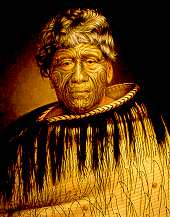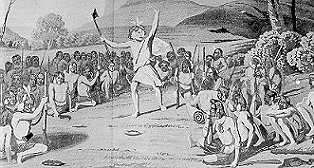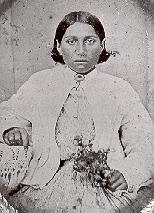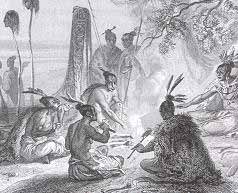In New Zealand, the Musket Wars were in full swing, and in late 1835, two tribes, the Ngati Tama and Ngati Mutunga of the Waiarapa, were being harried.
They had to find refuge, and some Maori who had crewed aboard European ships brought stories of an island that was abundant in food - called Wharekauri in Maori, the Chathams in English - the home of the Moriori.
The Ngati Tama and the Ngati Mutunga agreed to invade Wharekauri. They hired the sealer "Bee" to transport them in 2 voyages. Matioro of the Ngati Mutunga, went in the first 3-day journey, after striking a deal with the Ngatio Tama that they would wait for the latter tribe to also arrive before seizing the best land.
In 1833 Matioro arrived. He may have deliberately broken a Moriori tapu to force a confrontation - one man was killed and twelve hung from a tree until nearly dead by the ship's crew, who were clearly not impartial observers.
Matioro was bemusedly described by the Moriori "as having 'strutted and pranced' on the beach in a very arrogant and aggressive manner." (The Musket Wars, RD Crosby, Reed)
It may be Matioro who reported back to his tribe in New Zealand - others suggest it was Te Ururanga, Rihari, Arangata and Te Ira who had returned to NZ in 1834, aboard a whaling ship.
"It is a land of food - he whenua kai! It is full of birds, both land- and sea-birds of all kinds .. with albatross in plenty on the outlying islands. There is an abundance of sea and shellfish; the lakes swarm with eels; and it is a land of the kataka berry .. the inhabitants are very numerous, but they do not understand how to fight, and have no weapons"

In October 1835 the brig "Lord Rodney" was commissioned by the chief Pomare (above) in Wellington harbour, and Captain Harwood ordered to sea, with 500 Ngati Tama aboard.
They had initally been undecided where to head, considering not only the Chatham Islands, but also Norfolk or even Samoa - but eventually agreed to aim for Wharekauri.
Captain Harwood then offloaded his passengers and returned to Wellington to collect 400 Ngati Mutunga, and by the end of the year all 900 Maori were on the Chathams.
The Ngati Tama had built a settlement at Waitangi, so the Ngati Mutunga moved to Whangaroa Harbour.
This was the beginning of the end for the peaceful Moriori.
The Ngati Tama immediately began to scour the Island, armed with muskets, tomahawks and clubs, to "takahi", or "walk the land" - that is, walk across any land they desired, taking whatever they saw as their own, and simply killing anyone - 267 eventually - who objected.
The Moriori recoiled before this blatant intrusion into what they thought was their hospitality, and a meeting of all the tribes assembled, around a 1,000 men, at Te Awapatiki - sacred grove - to discuss what to do about the new arrivals.
The Maori had arrived sick in the Chathams, from dysentry, seasickness and hunger - the Moriori had nursed them back to health. Now those people were killing their people.
They still outnumbered the Maori two-to-one, and could have fought, and would probably have driven the Maori into the sea - hunter/gathering breeds strong survivors.
But the Moriori meeting was discovered by the Maori, who immediately interpreted it as a council of war - it is what the Maori would have done in the same circumstances. The Maori immediately attacked.

So the offer of peace was probably not delivered, and even if it had been it would have been interpreted as weak, an act of cowardice. Maori tradition and experience - including their recent flight - would not embrace this notion, that non-violence could have mana, or prestige.
Accordingly, in the words of one of the
invaders, Rakatau Katihe,
"we took possession .. in accordance with our customs and we caught
all the people. Not one escaped. Some ran away from us, these we killed, and
others we killed - but what of that? It was in accordance with our custom
.. I am not aware of any of our people being killed by them"
Moriori stayed true to their moral imperative, Nunuku's law of non-violence, even as they and their families were being bludgeoned and speared to death. That is not to say they were not terrified, but their fortitude and courage must have been phenomenal. Pacifism in the face of sure death is hard to imagine.
The Europeans did nothing.
As described by Hirawana Tapu, the invaders
"..commenced to kill us like sheep ..we were terrified, fled to the
bush, concealed ourselves in holes underground, and in any place, to escape
our enemies. It was of no avail; we were discovered and killed - men, women,
and children"

"I was shown a part of a beach
on the Chatham Islands on which the bodies of eighty Moriori women were laid
side by side, each with an impaling stake driven into the abdomen. It is difficult
for one not accustomed to savage warfare to note how shockingly callous and
heartless this desecration of the human body made the actors in these terrible
scenes."
Edward Tregear "The Maori
Race, New Zealand" pub. 1904
The Moriori who were not killed were enslaved, and kept as food stock, some being taken back to New Zealand.
It is hard to imagine the anguish of a slave to be kept working, until one day to be casually tomahawked, and eaten, much as we would despatch a rooster or a turkey.
This continued until at least for another 7 years, and the Europeans still did nothing.

"When the Maoris overcame the gentle Morioris of the Chatham Islands, not only did they keep the captives penned up like live-stock waiting to be killed and eaten, but one of the leading chiefs of the invaders ordered a meal of six children at once to be cooked to regale his friends."
This
Web Directory will always be dynamic ~
all details are flexible and changing